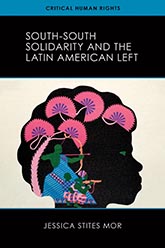|
South-South Solidarity and the Latin American Left
Jessica Stites Mor
Critical Human Rights
Scott Straus and Tyrell Haberkorn, Series Editors; Steve J. Stern, Editor Emeritus
“This volume so convincingly demonstrates South-South interactions are as important if not more so than interactions from the north to the south. Both scholars and a broader public with interests in solidarity and political mobilizations will warmly welcome Stites Mor's insightful contributions to our understandings of solidarity.”
—Marc Becker, author of Twentieth-Century Latin American Revolutions
Transnational solidarity movements often play an important role in reshaping structures of global power. However, there remains a significant gap in the historical literature on collaboration between parties located in the Global South. Facing increasing repression, the Latin American left in the 1960s and 1970s found connection in transnational exchange, organizing with distant activists in Africa, the Middle East, and the Caribbean. By exploring the particularities of South-South solidarity, this volume begins new conversations about what makes these movements unique, how they shaped political identities, and their lasting influence.
Jessica Stites Mor looks at four in-depth case studies: the use of legal reform to accomplish the goals of solidarity embedded in Mexico’s revolutionary constitution, visual and print media circulated by Cuba and its influence on the agenda of the Afro-Asian block at the United Nations, organizing on behalf of Palestinian nationalism in reshaping Argentina’s socialist left, and the role of Latin American Catholic activists in challenging the South African apartheid state. These examples serve as a much-needed road map to navigate our current political climate and show us how solidarity movements might approach future struggles.
Jessica Stites Mor is a professor of history at the University of British Columbia, Okanagan (Syilx territory). She is the author of Transition Cinema: Political Filmmaking and the Argentine Left since 1968 and editor of Human Rights and Transnational Solidarity in Cold War Latin America.
Praise
“Stites Mor’s expertise has established her as a leading authority on histories of Latin America, solidarity, human rights and culture. This book builds on her work, positioning the region in a global context and offering new conceptual frameworks to theorize solidarity, its practices, results, and legacies. This exciting and ambitious contribution is a pleasure to read.”
—Tanya Harmer, author of Beatriz Allende: A Revolutionary Life in Cold War Latin America
“Offers major contributions to several interconnected fields. . . . With this book Stites Mor joins the best of transnational historians in pushing traditional boundaries and expanding our understanding of the complex realities in our interconnected world. Moreover, she challenges scholars of transnational solidarity to expand our definitions of “activist,” to attend to the long term of solidarity work (beyond the protest marches and other public flares), and to uncover precisely how ideas of solidarity and partnership are communicated, received, and acted upon.”
—The Americas
“Ambitious. It tackles four very different cases of South-South connections using archives from eight countries.”
—Hispanic American Historical Review
“Ambitious. . . . A welcome and much-needed intervention. . . . Stites Mor compellingly shows how Latin Americans in the 1960s and 1970s built relationships—both real and imagined—with people, organizations, and states in Africa, Asia, and other Latin American countries. . . . Stites Mor’s seminal work will be a source of inspiration.”
—H-Net Reviews
“Adds significantly to historiography on solidarity movements, which often focuses on campaigns originating in the Global North. Stites Mor provides a new perspective by looking at South-South connections, arguing that the expression of transnational solidarity was a formative and unifying experience for the Latin American Left.”
—Latin American Research Review
“A well-researched and substantive work that provides a needed corrective to social movement studies by challenging scholars to look at solidarity in newer ways and in different places. . . . Stites Mor not only enriches the understanding of solidarity but also shows how art and literature created by social movements have long-standing impacts.”
—The Latin Americanist
Of Related Interest
|

Long Journey to Justice
El Salvador, the United States, and Struggles against Empire
Molly Todd |

Buried Histories
The Anticommunist Massacres of 1965–1966 in Indonesia
John Roosa |
|

Larger images
New in Paperback!
January 2024
LC: 2021023502 F
280 pp. 6 x 9
25 b/w illus.
|

